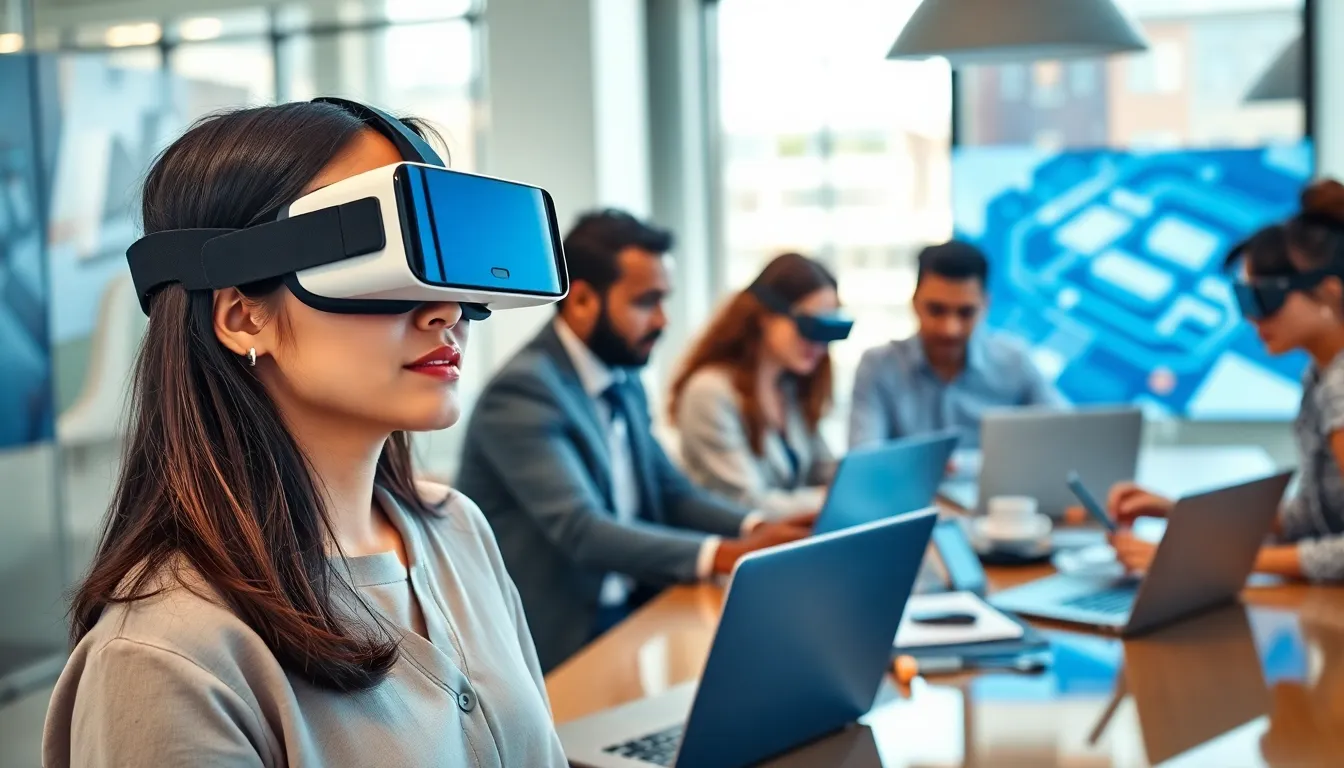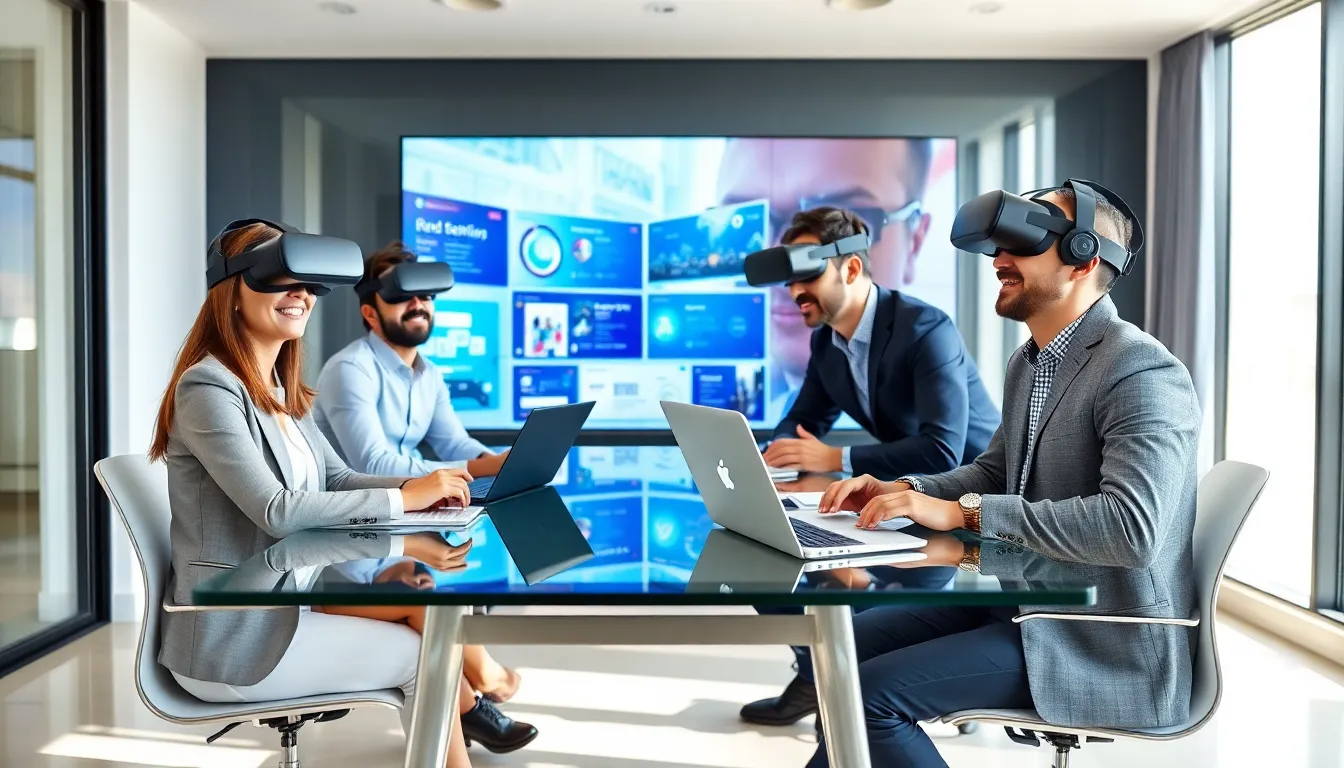Table of Contents
ToggleImagine stepping into a world where the impossible becomes possible. Virtual reality (VR) isn’t just for gamers anymore: it’s reshaping industries from education to healthcare. If you’ve ever dreamt of creating immersive experiences that transport users to another realm, then virtual reality app development services are your gateway. With these advancements, your ideas can leap off the page and engage users like never before. Ready to explore the universe of virtual reality? Let’s immerse.
Understanding Virtual Reality and Its Applications

Virtual reality immerses users in a digitally created environment, often through VR headsets, motion tracking, and simulated senses. This technology bridges the gap between the real world and the digital realm, making it possible to experience everything from thrilling roller coasters to a peaceful beach sunset without leaving the couch.
Various industries are exploring VR applications:
- Gaming: As the first domain to truly capitalize on VR, gaming creates rich, interactive experiences that keep players coming back for more.
- Education: Virtual reality helps students visualize concepts like ancient civilizations or complex biology through immersive lessons.
- Healthcare: VR training programs allow medical professionals to practice procedures safely and effectively.
- Real Estate: Virtual property tours enable prospective buyers to explore homes remotely.
Understanding these applications opens numerous doors for businesses looking to innovate and engage customers.
Key Components of Virtual Reality App Development
Creating a successful virtual reality app hinges on several core components:
Hardware
Developers need to account for the variety of headsets and motion controllers available. Popular devices include the Oculus Quest, HTC Vive, and PlayStation VR, each offering unique capabilities and user experiences.
Software Development Kits (SDKs)
SDKs are essential for building a VR application. They provide libraries and tools to help the development process. Unity and Unreal Engine are well-known examples that many developers prefer due to their robust features.
User Interface & Experience (UI/UX)
A user-friendly interface significantly affects user engagement. The design should be intuitive, allowing users to navigate seamlessly within the immersive environment.
Content Creation
Whether developing 3D animations, audio, or interactive storytelling, high-quality content is vital. This content must captivate users, ensuring they remain immersed and interested throughout their experience.
The Benefits of Investing in Virtual Reality Apps
Investing in virtual reality app development comes with numerous advantages:
- Enhanced Engagement: Users often find VR experiences more engaging than traditional applications. This heightened interaction can lead to increased customer retention.
- Competitive Edge: Companies leveraging VR technologies often stand out in their industry, showcasing innovation and a commitment to modern solutions.
- Data-Driven Insights: VR allows businesses to gather unique behavioral data, providing understanding of user interactions and preferences.
- Cost-effectiveness over time: Although initial development costs can be high, VR can reduce long-term expenses related to training, real estate tours, or product demonstrations by creating effective, reusable experiences.
Choosing the Right Development Partner
Selecting the right development partner is crucial for success. Here’s what to keep in mind:
- Experience and Portfolio: A seasoned developer will have a portfolio showcasing diverse projects. This experience signifies their ability to handle various challenges and deliver effectively.
- Technical Expertise: Ensure they are proficient in the necessary technologies including Unity, Unreal Engine, and relevant SDKs.
- Client Reviews: Feedback and testimonials from previous clients can provide insight into their professionalism and reliability.
- Post-Development Support: Good partners offer ongoing support and updates, ensuring the app remains current as technology evolves.
Emerging Trends in Virtual Reality Development
The VR landscape is constantly evolving, with several trends shaping its future:
Cross-Platform Compatibility
As users leverage various devices for VR experiences, developers are focusing on creating applications that function seamlessly across platforms.
Social VR Experiences
The demand for social interaction within VR is rising. Developers are building applications that allow users to interact and collaborate within virtual spaces, further blurring the lines between reality and the digital world.
Integration with Artificial Intelligence (AI)
AI is enhancing the realism of VR experiences by creating adaptive environments that respond to user behavior, making the virtual world feel alive.
Augmented Reality (AR) Synergy
The merging of AR and VR, often termed Extended Reality (XR), is opening up new avenues for immersive experiences, making it an exciting field for developers to explore.
Case Studies of Successful Virtual Reality Applications
Several companies have successfully leveraged VR applications, showcasing their potential:
- IKEA Place: This app allows users to visualize how IKEA furniture will look in their homes, revolutionizing the shopping experience.
- Google Earth VR: This application transports users around the globe, enabling exploration from the comfort of their homes.
- VR Health: This initiative has been employed in various fitness apps, providing immersive workouts that engage and motivate users through gamification.
These examples illustrate the diverse potential applications of VR across different fields and industries.





